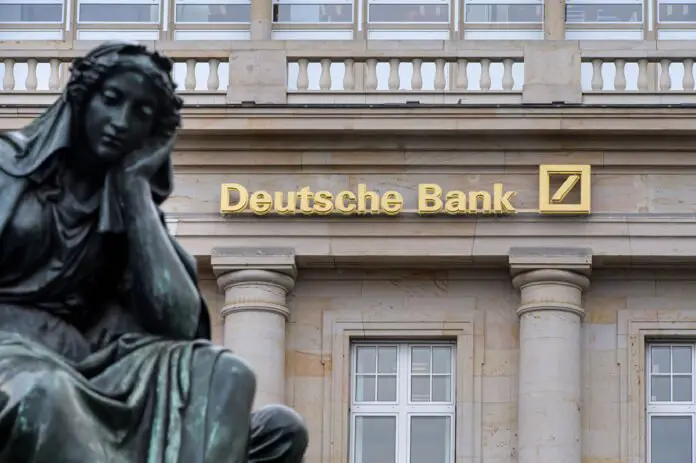Staff Reporter
Deutsche Bank (DB, DBK.DE) announced a 39% increase in first-quarter profit on Tuesday, driven largely by a surge in revenue from its global investment banking division, particularly in bond and currency trading amid volatile market conditions.
Despite the profit boost, the bank faced challenges, including a writedown related to a leveraged-finance deal and additional provisions to address potential tariff impacts on clients.
Germany’s largest lender reported a net profit attributable to shareholders of €1.78 billion ($2.03 billion) for the quarter, up from €1.28 billion a year earlier, surpassing analysts’ expectations of €1.64 billion.
These results mark the beginning of a pivotal year for Deutsche Bank as it wraps up a three-year strategic plan and seeks to meet ambitious targets set by management. CEO Christian Sewing stated, “The results put us on track for delivery on all our 2025 targets.”
Sewing, reappointed as CEO in March, is refining the bank’s strategy and setting goals for the upcoming year and beyond.
This quarter’s performance is significant as it reflects a cumulative profit for Deutsche Bank that exceeds losses over the past decade, recovering from substantial setbacks between 2015 and 2019.
Analysts at Barclays noted that the results were “good enough for the shares to outperform slightly,” leading to a 2.9% increase in share price.
Deutsche’s fixed-income and currency trading revenues, one of its largest sectors, rose by 17%, exceeding expectations for a 10.3% increase. JPMorgan analysts highlighted these results as the best among Deutsche’s global peers.
However, the origination and advisory segment saw an 8% revenue decline after previous strong performances, including a €90 million writedown in its leveraged finance business.
As several major European banks release quarterly results this week, following robust earnings from U.S. counterparts, investors remain cautious.
The recent escalation of a global trade war initiated by U.S. President Donald Trump raises concerns about potential economic slowdowns that could dampen loan demand and affect client financial health.
In a memo to staff, Sewing noted, “We have taken additional provisions to cover higher macroeconomic uncertainties caused by the tariff discussions, leading to an increase in our overall provisions year-on-year.”
While Deutsche Bank operates globally from Sydney to New York, its core market in Germany has been facing stagnation. The country’s top central banker recently warned of a possible slight recession in 2025, which could impact bank profits and lead to loan defaults among corporate clients.
As Sewing works to achieve his ambitious profit and cost targets, some analysts express skepticism about the bank’s ability to meet all its objectives, particularly after Deutsche abandoned a key cost target earlier this year.
Nevertheless, Germany’s decision to relax long-standing caps on government spending is viewed favorably for both the lender and the broader economic outlook.

